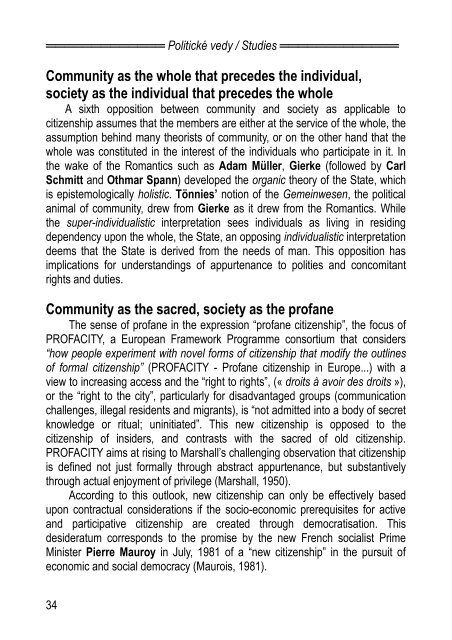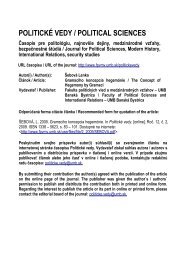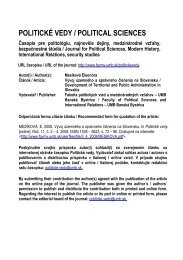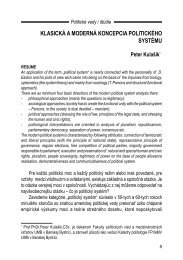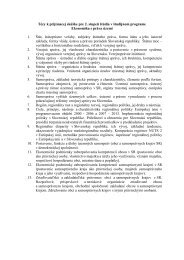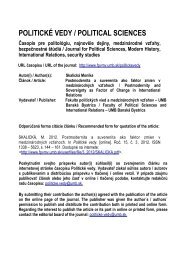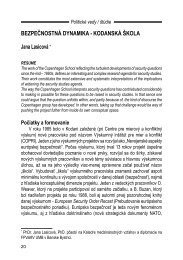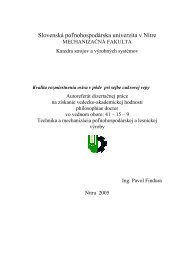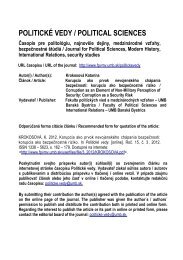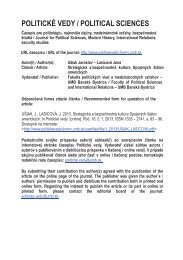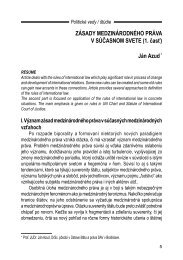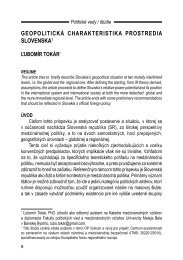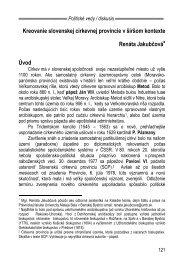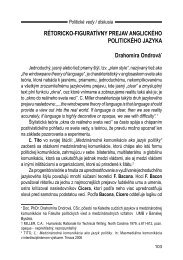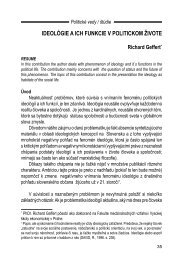Citizenship in Community and Society: Ferdinand ... - Politické vedy
Citizenship in Community and Society: Ferdinand ... - Politické vedy
Citizenship in Community and Society: Ferdinand ... - Politické vedy
Create successful ePaper yourself
Turn your PDF publications into a flip-book with our unique Google optimized e-Paper software.
═════════════ Politické <strong>vedy</strong> / Studies ═════════════<br />
<strong>Community</strong> as the whole that precedes the <strong>in</strong>dividual,<br />
society as the <strong>in</strong>dividual that precedes the whole<br />
A sixth opposition between community <strong>and</strong> society as applicable to<br />
citizenship assumes that the members are either at the service of the whole, the<br />
assumption beh<strong>in</strong>d many theorists of community, or on the other h<strong>and</strong> that the<br />
whole was constituted <strong>in</strong> the <strong>in</strong>terest of the <strong>in</strong>dividuals who participate <strong>in</strong> it. In<br />
the wake of the Romantics such as Adam Müller, Gierke (followed by Carl<br />
Schmitt <strong>and</strong> Othmar Spann) developed the organic theory of the State, which<br />
is epistemologically holistic. Tönnies’ notion of the Geme<strong>in</strong>wesen, the political<br />
animal of community, drew from Gierke as it drew from the Romantics. While<br />
the super-<strong>in</strong>dividualistic <strong>in</strong>terpretation sees <strong>in</strong>dividuals as liv<strong>in</strong>g <strong>in</strong> resid<strong>in</strong>g<br />
dependency upon the whole, the State, an oppos<strong>in</strong>g <strong>in</strong>dividualistic <strong>in</strong>terpretation<br />
deems that the State is derived from the needs of man. This opposition has<br />
implications for underst<strong>and</strong><strong>in</strong>gs of appurtenance to polities <strong>and</strong> concomitant<br />
rights <strong>and</strong> duties.<br />
<strong>Community</strong> as the sacred, society as the profane<br />
The sense of profane <strong>in</strong> the expression “profane citizenship”, the focus of<br />
PROFACITY, a European Framework Programme consortium that considers<br />
“how people experiment with novel forms of citizenship that modify the outl<strong>in</strong>es<br />
of formal citizenship” (PROFACITY - Profane citizenship <strong>in</strong> Europe...) with a<br />
view to <strong>in</strong>creas<strong>in</strong>g access <strong>and</strong> the “right to rights”, (« droits à avoir des droits »),<br />
or the “right to the city”, particularly for disadvantaged groups (communication<br />
challenges, illegal residents <strong>and</strong> migrants), is “not admitted <strong>in</strong>to a body of secret<br />
knowledge or ritual; un<strong>in</strong>itiated”. This new citizenship is opposed to the<br />
citizenship of <strong>in</strong>siders, <strong>and</strong> contrasts with the sacred of old citizenship.<br />
PROFACITY aims at ris<strong>in</strong>g to Marshall’s challeng<strong>in</strong>g observation that citizenship<br />
is def<strong>in</strong>ed not just formally through abstract appurtenance, but substantively<br />
through actual enjoyment of privilege (Marshall, 1950).<br />
Accord<strong>in</strong>g to this outlook, new citizenship can only be effectively based<br />
upon contractual considerations if the socio-economic prerequisites for active<br />
<strong>and</strong> participative citizenship are created through democratisation. This<br />
desideratum corresponds to the promise by the new French socialist Prime<br />
M<strong>in</strong>ister Pierre Mauroy <strong>in</strong> July, 1981 of a “new citizenship” <strong>in</strong> the pursuit of<br />
economic <strong>and</strong> social democracy (Maurois, 1981).<br />
34


